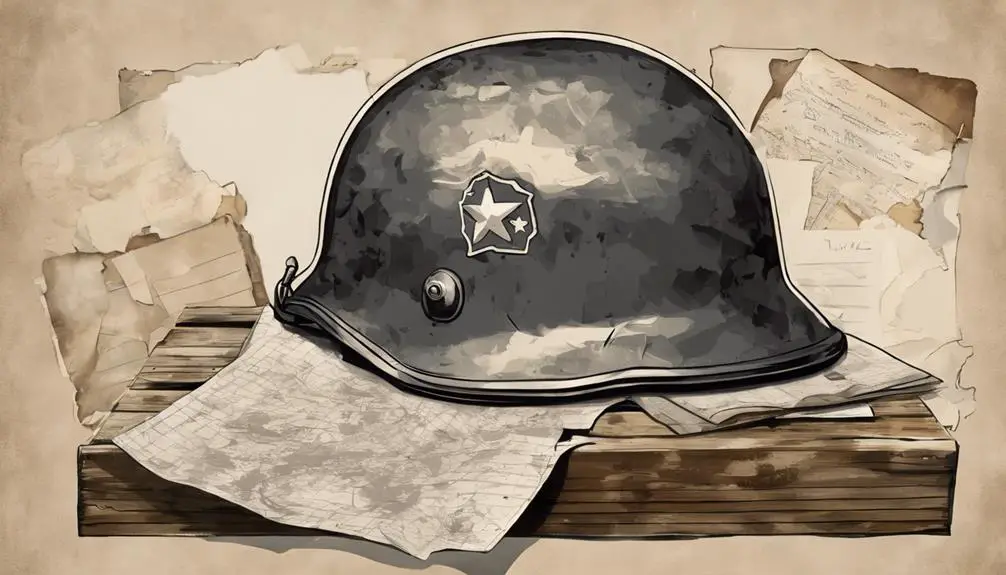When you hear the term 'bloke' in a military context, you're likely listening to a British soldier, as this colloquialism has been an integral part of the UK's military culture since the early 20th century. It originated in World War I trenches to foster national identity and camaraderie among soldiers. Today, 'bloke' is part of a unique dialect that's evolved from British military slang, which has been influenced by colonial endeavors, cultural fusion, and historical events. As you explore the complexities of military language, you'll uncover more about the important roles slang plays in military settings and how it continues to adapt to modern warfare.
Origins of British Military Slang
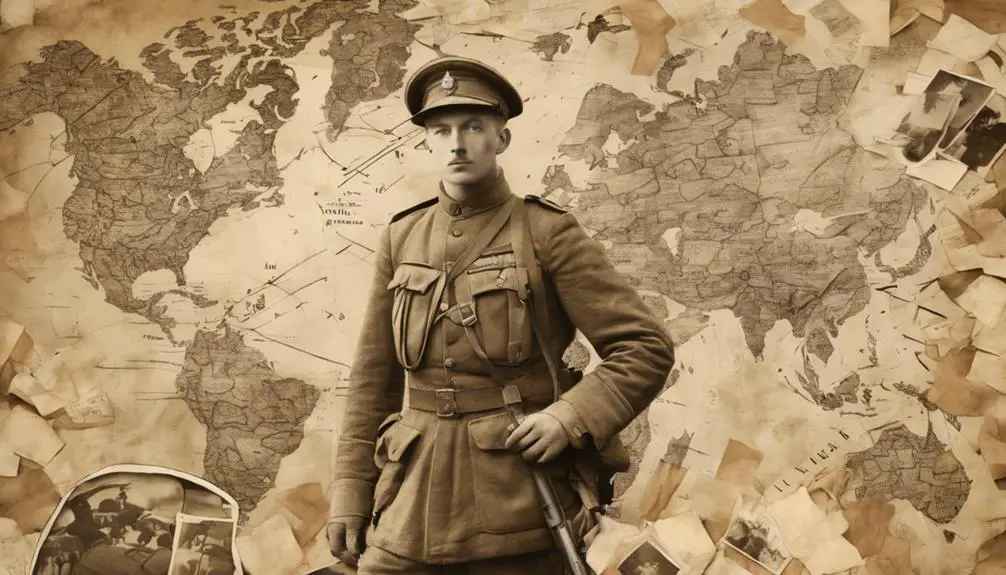
Since the 16th century, British military slang has been shaped by the nation's colonial endeavors, with soldiers and sailors adopting words and phrases from the languages of the territories they occupied. As you explore the origins of British military slang, you'll discover that war etymology and historical roots play a significant role.
The language of war has been influenced by various cultures, from Hindi and Arabic to African and Caribbean dialects. You'll find that many military terms have been borrowed from local languages, adapted to fit the British military context.
For instance, the word 'thug' originated from the Hindi 'ठग' (thug), meaning 'swindler' or 'cheat.' Similarly, 'loot' comes from the Hindi 'लूट' (lut), meaning 'plunder' or 'spoils.'
The historical roots of British military slang are deeply intertwined with the nation's colonial past, reflecting the cultural exchange and linguistic adaptation that occurred during this period. As you explore further, you'll uncover a rich tapestry of war etymology, revealing the complex and fascinating history behind British military slang.
The Birth of 'Bloke' Culture
As you explore the evolution of British military slang, you'll discover that the early 20th century marked an important turning point in the development of 'bloke' culture, a phenomenon that would come to define the British soldier's identity.
During this period, the British Army underwent significant transformations, including the expansion of conscription and the growth of the working-class population in the military. This shift led to the emergence of a distinct 'bloke' culture, characterized by a strong sense of working-class masculinity.
The 'bloke' identity was forged in the trenches of World War I, where soldiers from diverse backgrounds came together to fight for their country. This shared experience of war fostered a sense of national identity, as soldiers from different regions and social classes united under a common purpose.
The 'bloke' culture that emerged was rooted in working-class values, emphasizing camaraderie, resilience, and loyalty. As you explore further into the history of British military slang, you'll find that this cultural phenomenon played an important role in shaping the British soldier's identity and continues to influence military culture to this day.
Squaddie Lingo in Modern Wars
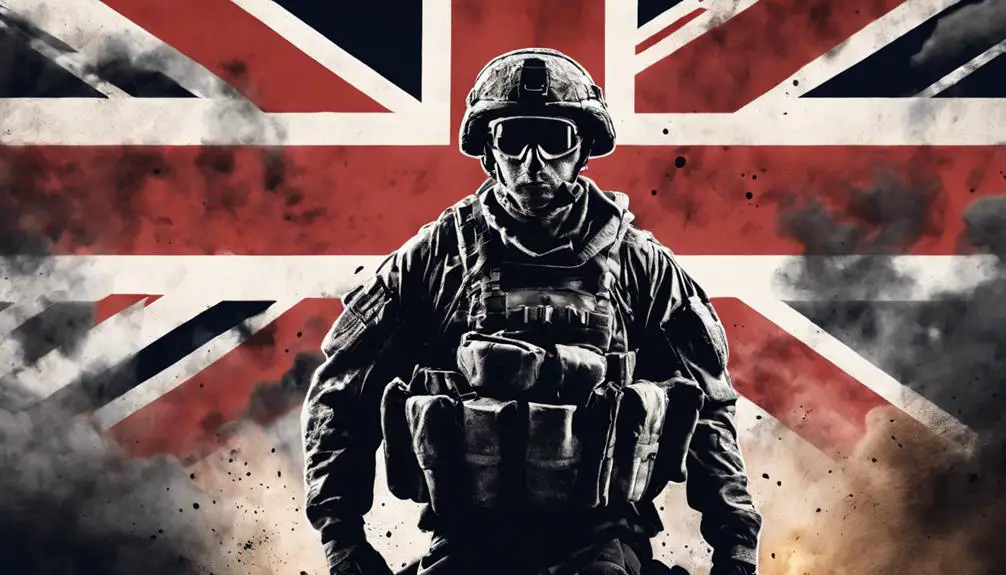
In modern military conflicts, you're likely to hear British soldiers using a unique dialect that has evolved from the 'bloke' culture, with colloquialisms like 'squaddie' and 'mucker' becoming integral to their communication.
This squaddie lingo has become an essential part of their everyday language, allowing them to quickly convey complex ideas and emotions in high-pressure situations. Warrior banter, a key aspect of this lingo, serves as a coping mechanism, helping soldiers to release tension and build camaraderie.
Combat codes, such as using 'ossifer' for officer, have also become an integral part of this dialect. These codes enable soldiers to communicate sensitive information discreetly, ensuring operational security.
As you explore further into the world of squaddie lingo, you'll discover that it's not just a quirky aspect of military culture, but a crucial tool that facilitates effective communication and bonding among soldiers.
Evolution of Military Jargon
As you explore the evolution of military jargon, you'll notice that it's been influenced by code switching, where servicemen adapt to new linguistic contexts. This investigation is evident in the use of acronyms, abbreviations, and technical terms that have become integral to military communication.
In a historical context, military jargon has been shaped by cultural fusion, where different nationalities and ethnicities have contributed to the development of unique linguistic patterns. For instance, during World War II, the Allied forces adopted French and German phrases, which became an integral part of their communication. This linguistic adaptation has continued to evolve, reflecting the changing nature of modern warfare.
As you research the evolution of military jargon, you'll discover that it's a dynamic language system that continues to adapt to new operational environments and technological advancements.
Colloquialisms in the Trenches
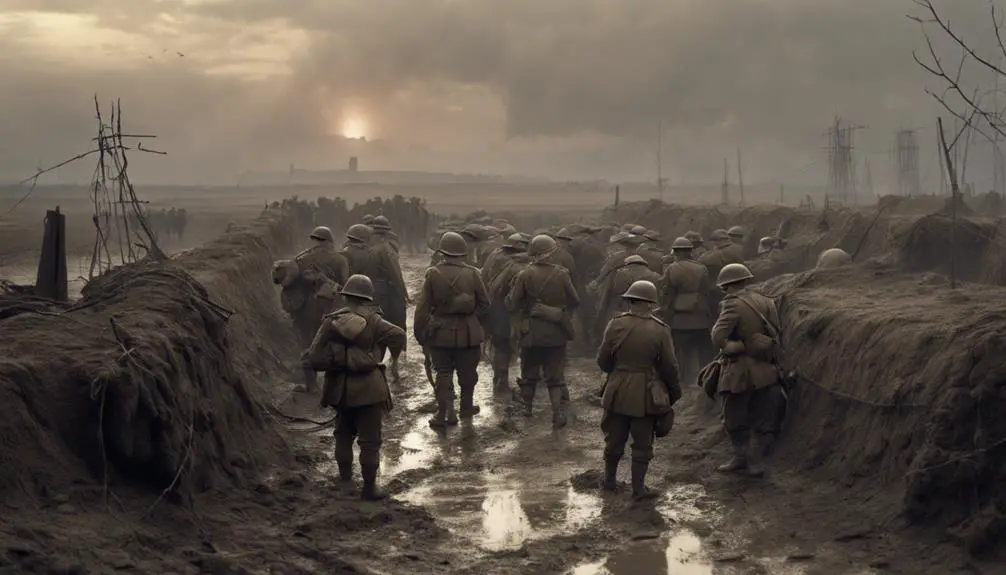
Troops often relied on colloquialisms, such as 'bloke' for a fellow soldier, to create a sense of camaraderie and shared experience in the trenches.
You'll find that these colloquialisms played a significant role in shaping the soldier psyche during wartime. By using everyday language, soldiers could momentarily escape the harsh realities of combat and connect with their comrades on a deeper level.
Trench humor, in particular, became a coping mechanism to deal with the trauma and uncertainty of war. Soldiers would often use dark humor to make light of their situation, which helped to boost morale and maintain a sense of normalcy.
This colloquial language also helped to create a sense of group identity, distinguishing soldiers from civilians and fostering a sense of belonging. By examining the colloquialisms used in the trenches, you can gain insight into the psychology of soldiers during wartime and the ways in which they adapted to their environment.
Slang in the Royal Navy
As you explore the world of Royal Navy slang, you'll uncover a unique lexicon that reflects the maritime environment and the sailors' experiences. The Royal Navy's linguistic landscape is characterized by Nautical Neologisms, which are born from the fusion of technical jargon, colloquialisms, and cultural influences.
These Naval Nicknames and phrases have been shaped by the Navy's rich history, its international deployments, and the diverse backgrounds of its personnel.
Some examples of Royal Navy slang include:
- Gash: referring to food, particularly of poor quality
- Crab: a derogatory term for a Royal Marine
- Dits: stories or rumors, often exaggerated or apocryphal, shared among sailors
These colloquialisms not only add flavor to naval communication but also serve as a badge of identity for those who serve.
By immersing themselves in this distinct slang, Royal Navy personnel reinforce their sense of community and shared experience.
As you investigate further into the world of Royal Navy slang, you'll discover a fascinating reflection of the Navy's values, traditions, and history.
RAF's Unique Vernacular
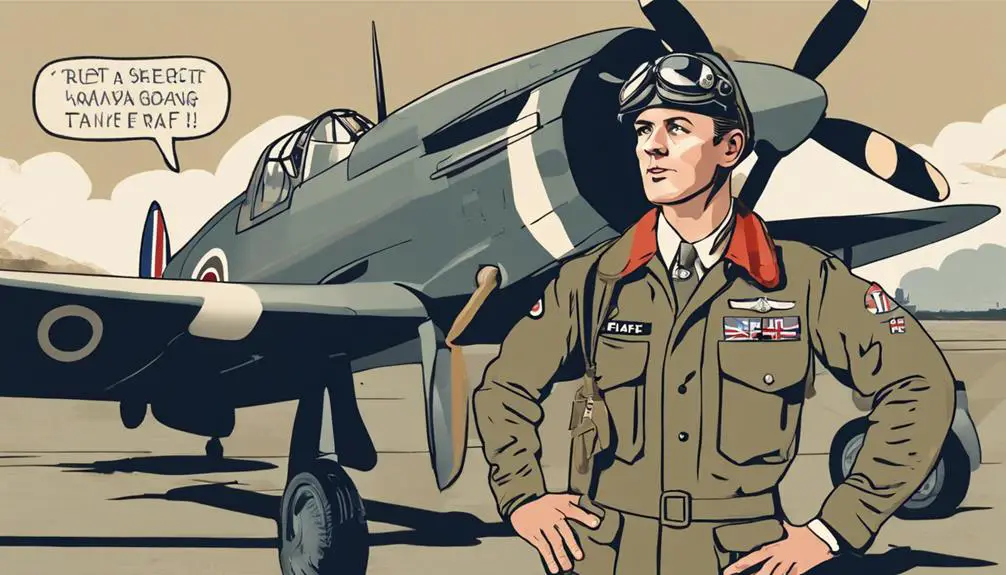
In contrast to the Royal Navy's nautical neologisms, the Royal Air Force (RAF) has developed its own distinct vernacular, shaped by the unique demands and culture of military aviation. You'll explore that RAF slang is characterized by a unique blend of airborne idioms, fighter lingo, and winged phrases that reflect the fast-paced, high-stakes environment of military flying.
When you investigate further, you'll discover that radar dialect and jet jargon are integral parts of the RAF's linguistic repertoire. Aerial argot, flight colloquialisms, and squadron slang also play a significant role in shaping the RAF's communication culture. For instance, RAF personnel might use terms like 'scram' to signify an emergency takeoff or 'bandit' to identify an enemy aircraft.
The RAF's unique vernacular serves as a badge of identity, forging a sense of community and shared experience among its personnel. By adopting this specialized language, RAF members can quickly convey complex information, establish trust, and reinforce their esprit de corps. As you explore the world of RAF slang, you'll gain a deeper appreciation for the intricate nuances of military communication.
Deciphering Military Slang Today
You'll need to crack the code of military slang to stay ahead in today's fast-paced defense landscape. With the increasing complexity of military operations, understanding military slang is vital for effective communication and decision-making. As military literacy becomes more important, deciphering military slang is no longer a luxury, but a necessity.
To improve your military literacy, focus on the following aspects:
- Slang revival: Stay updated on the latest military slang, as it evolves rapidly. Familiarize yourself with new terms and phrases that emerge from recent conflicts and operations.
- Contextual understanding: Don't just memorize slang terms; understand the context in which they're used. This will help you grasp the nuances of military communication and make informed decisions.
- Inter-service collaboration: Recognize that different branches of the military have their unique slang. Be able to communicate effectively across services to promote seamless collaboration and cooperation.
Frequently Asked Questions
Is Military Slang Only Used by Enlisted Personnel?
You might think that military slang is exclusive to enlisted personnel, but that's not entirely true. In reality, military slang is used across the military hierarchy, from top-brass officers to new recruits.
It's a cultural identity that transcends rank, fostering a sense of community and shared experience. While enlisted personnel may use slang more frequently, officers also use it to connect with their troops and show they're part of the team.
Can Civilians Use Military Slang Without Offending Veterans?
As you navigate the blurred lines of language, you wonder if civilians can use military slang without offending veterans. It's a minefield of cultural appropriation, where borrowing phrases can be seen as disrespectful.
However, language evolution is a natural process, and slang often bleeds into mainstream culture. If you're mindful of the origins and context, using military slang can be a form of appreciation, not appropriation.
Just be respectful and aware of the history behind the words.
Are There Differences in Slang Between Enlisted and Officers?
You might wonder if there are differences in slang between enlisted and officers. The answer is yes.
Rank dynamics play a significant role in shaping the language used by each group. Officers, who often share a sense of camaraderie, tend to use more formal and professional language, whereas enlisted personnel may use more colloquialisms and slang.
This language divide reflects the distinct cultural and social norms within each group, highlighting the complexities of military communication.
How Does Military Slang Impact Communication in Combat?
You're dropped into the chaos of a battlefield, where every second counts. In this high-stakes environment, clear communication is vital. Military slang can have a profound impact on communication in combat, as it can either enhance or hinder Battlefield Clarity.
When used effectively, slang can convey Tactical Nuance quickly, allowing teams to adapt and respond rapidly. However, if not understood, it can lead to confusion, putting lives at risk.
Are Military Slang Words and Phrases Copyrighted?
You might wonder if military slang words and phrases are copyrighted. The answer is, generally, no. Military slang terms aren't eligible for copyright protection since they're informal language used by groups, not original literary or artistic works.
However, beware of using slang terms that are also trademarked brand names, as that could constitute trademark infringement. Be aware of legal protections surrounding intellectual property to avoid potential issues.
Conclusion
As you explore the world of British military slang, you're not just learning jargon – you're uncovering a hidden culture. Like a cryptic message from the front lines, each phrase and word reveals a piece of history, a glimpse into the camaraderie and chaos of war.
As you decipher the code, you're not just understanding language – you're reliving the experiences of those who fought, and honoring their legacy.

